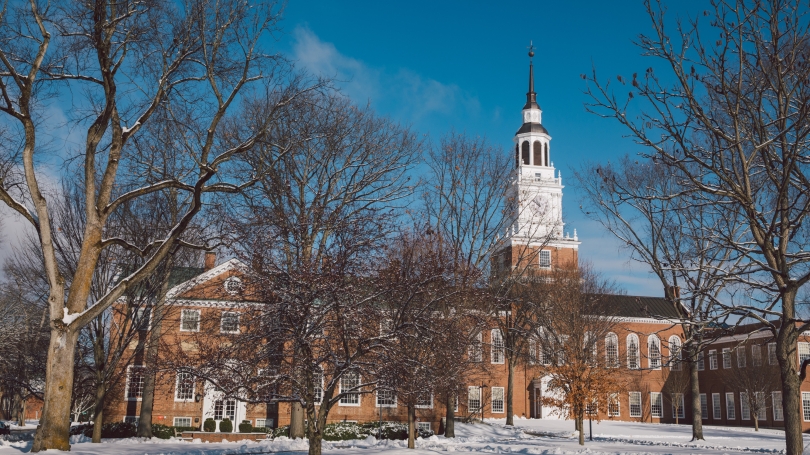
There is something nearly monastic about the rhythm of a winter week at Dartmouth. The days shorten until darkness seems to be the natural state of things, with daylight merely a brief interlude. Students emerge from their dormitories, perhaps the ‘Brittle’ cluster, into the brittle cold of a Hanover morning, faces half-hidden behind scarves, navigating pathways cleared of snow but not of ice. I have often wondered if there is a more profound metaphor for the intellectual journey than this daily trek—cautious, deliberate steps across treacherous ground, in pursuit of enlightenment, or at least sustenance.
The winter term has a particular character that separates it from its siblings. Fall brings the excitement of new beginnings, of campus awash in crimson and gold leaves. Spring carries the promise of warmth, of liberation from layers of clothing, of studying on the Green. But winter—winter demands a reckoning.
There is nowhere to hide in a Dartmouth winter. The social safety nets that cushion us in warmer months—impromptu gatherings on the Green, chance encounters during leisurely walks downtown—freeze over alongside Occom Pond.
Monday begins with the peculiar blue light that precedes sunrise in winter, as students shuffle to their 10s, many having already been awake for hours completing readings left untouched during the weekend’s diversions. The Baker-Berry bells toll across a landscape rendered alien by snow, their familiar chime a reminder that time continues its march despite the season’s attempt to suspend it. Inside classroom buildings, radiators hiss and clank, providing not just warmth but a percussive backdrop to discussions of Kant or cellular respiration or macroeconomic theory, or whatever it is that WGSS majors pontificate.
By Tuesday, the collective energy begins to wane. The novelty of a new week has worn off, but Friday remains a distant promise. This is when I notice the subtle shift in campus dynamics—the dining hall conversations that grow more introspective, the study spaces that fill earlier and empty later. There is something about the darkness that encourages both academic intensity and existential questioning. Under the weight of winter sky, even the most pragmatic students find themselves wondering about purpose and meaning between problem sets.
Wednesday marks the week’s fulcrum, the day when time seems to simultaneously accelerate and decelerate. Morning classes blend into afternoon study sessions, which extend into evening seminars, which dissolve into late-night conversations in dormitory common rooms. These conversations—philosophical, personal, absurd—become the unexpected salvation of winter term. When the physical world contracts under snow and cold, the intellectual one expands to fill the void.
Thursday carries the first hint of the weekend’s approach, a nearly imperceptible lightening of the collective mood. Students begin making plans, weighing social obligations against academic deadlines with the careful calculation of generals planning campaigns. The library begins to empty earlier, even professors seem affected, ending classes with remarks about upcoming lectures that serve as reminders that yes, there will be life beyond this particular week.
And then Friday arrives, bearing all the expectations of release and rejuvenation. The campus vibrates with a palpable energy that defies the cold. Lines form at Novack, at Collis, at every venue offering caffeine and carbohydrates to fuel the transition from academic to social beings. Classes end with a ceremonial finality, as if each conclusion were not merely the end of a week but a small victory against winter itself.Yet there is a danger in this weekly cycle, in the tendency to view weekdays merely as obstacles to overcome on the path to weekend revelry.
We risk living our Dartmouth lives in a perpetual state of anticipation, always looking forward to the next break in routine, the next celebration, the next escape from the perceived mundanity of academic life. In doing so, we miss the quiet beauty of winter weekdays; the camaraderie forged in study groups that extend past midnight; the unexpected clarity that comes from walking alone across a silent campus, breath visible in the cold air, thoughts crystallizing with each step.
The ten-week term passes quickly, despite winter’s attempt to slow time’s passage. Before we recognize it, midterms transform into finals, and another term joins the rapidly accumulating collection of collegiate memories.
As my time at Dartmouth draws to a close, I find myself wishing I had more winter weekdays ahead—more opportunities to experience the peculiar intensity of intellectual life in this northern outpost, more chances to walk across campus as snow falls silently around streetlamps, more moments of unexpected connection in the depths of February.
There is something essential about Dartmouth that reveals itself only in winter, when all external distractions are stripped away and we are left with the core of what this place is: a community of minds, working in concert against the darkness, generating enough light and warmth to sustain us until spring.

Be the first to comment on "Editorial: On Ten Weeks of Winter"